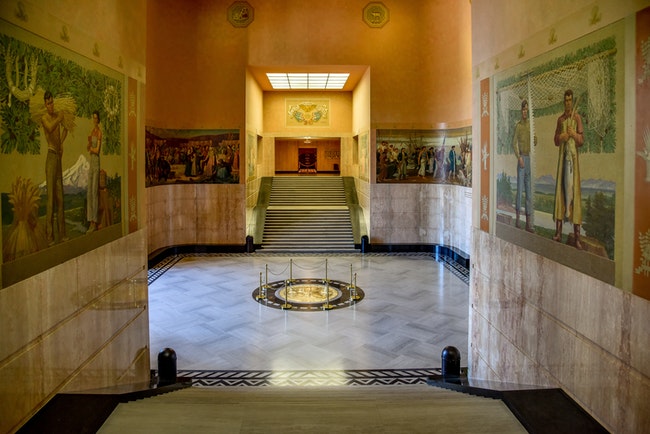 Oregon State Capitol, rotunda (Salem Reporter/file)
Oregon State Capitol, rotunda (Salem Reporter/file)
SALEM — As Oregon lawmakers prepare to meet for the month-long session that starts next week, Democrats’ effort to limit greenhouse gas emissions is getting a public nudge from business.
Twenty-one companies and two health care climate alliances in Washington and California, authored a letter Jan. 29 to “leadership and legislators of the Pacific Coast,” urging them adopt cap and trade programs, which they argue can promote economic growth.
Among signatories: Nike, the Beaverton-based sportswear behemoth and one of the state’s largest companies. Nike supported similar legislation last year.
Several other major companies, including Microsoft, Unilever and Uber, also signed the letter, which was organized by Ceres, a Boston-based nonprofit that aims to make businesses more environmentally sound.
Despite continued support from one of Oregon’s highest-profile businesses, the proposal faces the unpredictable nature of Oregon environmental politics.
Republicans in the Senate protested a similar proposal last year by leaving the state. Senate Republican Leader Herman Baertschiger, Jr., Grants Pass, won’t rule out boycotting the Legislature again to avoid voting on the proposal.
The companies that signed Wednesday’s letter say they support West Coast states implementing a cap on emissions and creating a system of allowances that are, simply put, permits to emit a certain amount of greenhouse gases.
California’s cap and trade system has been up and running since 2013. Neither Oregon nor Washington has one, but each is considering legislation to implement cap and trade programs. Each state could link to the Western Climate Initiative, a market for allowances that includes Quebec and California.
Under a cap and trade program, allowances to polluters decline over time to meet emissions reduction targets. Businesses can buy or sell allowances on the market if they plan to emit more or less than they are allotted.
“From agriculture, seafood and forestry to technology and advanced manufacturing, our region is built on a diverse set of industries,” the group of businesses wrote. “Carbon markets will expand economic opportunity in our region and spur innovation while protecting these sectors from climate impacts.”
The companies wrote that “cap and invest” initiatives have “proven to be highly effective in reducing (greenhouse gas) emissions, while fostering economic growth and spurring innovation.”
They wrote that market mechanisms help ensure that companies can reduce emissions more cheaply.
“This drives innovation and attracts investments that support the commercialization of low-carbon technologies, innovative practices to sequester carbon, and new jobs,” they wrote.
Vince Digneo, a sustainability strategist at the software company Adobe, one of the companies that signed the letter, said in a written statement that a policy “must be well designed.”
“We see cap-and-invest as a way to reduce emissions, to enable new, low-carbon technologies to be developed and deployed, and to generate funds that will grow jobs and economies,” said Digneo. “Proposals like this help bring affordable renewable energy not only to Adobe’s facilities in these regions, but also to the communities where our employees work and live, helping ensure that both businesses and people thrive in the long run.”
Wednesday’s letter, though, is merely one chord in what has proven to be a sonata of opinions on the proposal from private business, some fearing increased costs due to a program that penalizes emissions. Republicans say they are concerned that those costs could get passed on to consumers, particularly in rural areas of the state where per capita income is typically lower.
Last year, a group of businesses calling itself Oregon Business for Climate supported the proposal. That coalition included symbolically Oregon brands like Deschutes Brewery. But several businesses, including Deschutes, pulled out of the group after the bill became controversial in the wake of Republicans’ boycott.
UPDATE: The Craft Brew Alliance said on Thursday, Jan. 30, that it was not a signatory to the letter and that its name and signatory were included in the letter in error. An earlier version of this story cited the letter as the source that the alliance was part of the coalition issuing the letter.
Reporter Claire Withycombe: [email protected] or 971-304-4148.









